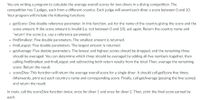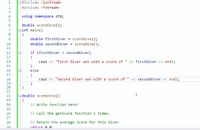
Database System Concepts
7th Edition
ISBN: 9780078022159
Author: Abraham Silberschatz Professor, Henry F. Korth, S. Sudarshan
Publisher: McGraw-Hill Education
expand_more
expand_more
format_list_bulleted
Question
C++ Question
Hello, Please create the correct code for the attached picture. Create the code based on the given requirements. PLEASE DO NOT USE ARRAYS IN THE CODE. There is also a 2nd picture of how the layout of the beginning of the code should look like. Please solve it correctly. Thank you!

Transcribed Image Text:You are developing a program to calculate the average overall scores for two divers in a diving competition. The competition involves five judges, each from a different country, who award scores ranging from 0 to 10. The program includes the following functions:
1. **getScore**: This function takes one double reference parameter. It prompts for the country’s name and the score given. If the score is invalid (i.e., not between 0 and 10), it prompts again. The function returns the country name and the score using a reference parameter.
2. **findSmallest**: This function takes five double parameters and returns the smallest score.
3. **findLargest**: This function takes five double parameters and returns the largest score.
4. **getAverage**: This function accepts five double parameters. The lowest and highest scores are discarded, and the remaining three are averaged. This is done by summing all five scores, subtracting the smallest and largest scores, and then averaging the remaining scores. The result is returned.
5. **scoreDive**: This function calculates the average overall score for a single diver. It calls getScore five times, prints each country’s name along with the score, calls getAverage with the five scores, and returns the average.
In the main function, `scoreDive` is called twice—once for diver 1 and once for diver 2. The final score for each diver is then printed.

Transcribed Image Text:```cpp
#include <iostream>
#include <fstream>
using namespace std;
double scoreDive();
int main()
{
double firstDiver = scoreDive();
double secondDiver = scoreDive();
if (firstDiver > secondDiver)
{
cout << "First Diver won with a score of " << firstDiver << endl;
}
else
{
cout << "Second Diver won with a score of " << secondDiver << endl;
}
}
double scoreDive()
{
// Write function here!
// Call the getScore function 5 times.
// Return the average score for this diver
return 0.0;
}
```
### Explanation:
This C++ program is designed to compare the scores of two divers and declare the winner based on their average scores. Key aspects include:
1. **Headers**: The program includes the `<iostream>` and `<fstream>` headers, enabling input-output stream functionalities.
2. **Namespace**: The `std` namespace is used, so you can use elements like `cout` without prefixing with `std::`.
3. **Function Declaration**:
- `double scoreDive();` is a function prototype, indicating that this function calculates scores for a diver.
4. **Main Function**:
- Calls `scoreDive()` to get scores for `firstDiver` and `secondDiver`.
- Uses an `if-else` statement to compare the scores and outputs which diver won along with their score.
5. **scoreDive Function**:
- Contains placeholder comments indicating where to implement the logic for:
- Calling a `getScore` function five times.
- Calculating and returning the average score for this diver.
- Currently returns `0.0` as a stub.
The program logic needs completion in the `scoreDive()` function to calculate real scores for meaningful output.
Expert Solution
This question has been solved!
Explore an expertly crafted, step-by-step solution for a thorough understanding of key concepts.
This is a popular solution
Trending nowThis is a popular solution!
Step by stepSolved in 4 steps with 3 images

Knowledge Booster
Learn more about
Need a deep-dive on the concept behind this application? Look no further. Learn more about this topic, computer-science and related others by exploring similar questions and additional content below.Similar questions
- You have square tiles with a side length of ⅓ inch Draw a 4 x 5 array using the square tiles. What are the dimensions of the rectangular array?arrow_forwardI need a code that demonstrates the use of the below items (Templates, overloading, and vectors). It doesn't need to be special and you can choose the example for the code. Maybe 30 - 50 lines of code that I can run in Visual Basic 2019. I just want to be able to compile it so that I understand what I am reading next week. Working examples are better than what I can pull from the single code examples in the book. Please label to help me identify. Thanks 1. Write C++ code (perhaps around 30-50 lines of code) and make it compile and run showing how to use: a. Templates b. Overloading c. Vectorsarrow_forwardadd a menu that you design which includes these features: Ability for a user to input a set of grades into a vector. Make sure only integers between 0 and 100 are used. Cout the vector onto the screen with grades separated by spaces and starting with, "Original user vector: " Output the average grade. Ability to sort the user-inputted vector from low to high or high to low. Cout the new sorted vector onto the screen with grades separated by spaces and starting with, "Grades sorted vector: " Using the binary search method (not the linear search method), add the ability to find a user selected grade and change it.arrow_forward
- I have an error inside my simple javascript code, I want you to fix it. The code is simple. The code is supposed to print an array with 10 elements, but when it comes to one element inside the array, it is supposed to concatenate a string value The problem with my code is it is printing all elements of the array, but it is not concatenating a string to one element. The problem is inside my print_array_changed function Generally, the code is required to print all elements with one element having a concatenated string. Look inside the print_array_changed function and fix it to attain the desired goal Code // create an array and assign values inside it const Employees = [ "JACK", "JILL", "Homer", "Lisa", "Bart", "Marge", "Burns", "Maggie" , "Amy", "Bill", ] // This function prints all elements…arrow_forwardPlease written by computer source In this lab you will create and fill a two-dimensional array of 25 Rectangle objects, arranged in a 5x5 grid. Each Rectangle should have dimensions 100x100, and be arranged on your window so that there is no space between Rectangles. Each Rectangle object should start with one fill color (e.g. white) and when pressed with the mouse it should toggle to a second color (e.g. gray). Pressing a second time on the Rectangle should toggle it’s fill color back to the first color. 3. Use the following template for your main() method. Add missing statements necessary to create your two- dimensional 5x5 Rectangle array and nested for-loops to fill the array with 25 new Rectangle objects, located on your window in a regular 5x5 grid. Make sure to set the mouse-pressed event handler for each new Rectangle. 2. Declare at least two public static variables: a 2D array of Rectangle objects, and a Pad variable: public static Pad pad; public static void main(String[]…arrow_forward
arrow_back_ios
arrow_forward_ios
Recommended textbooks for you
 Database System ConceptsComputer ScienceISBN:9780078022159Author:Abraham Silberschatz Professor, Henry F. Korth, S. SudarshanPublisher:McGraw-Hill Education
Database System ConceptsComputer ScienceISBN:9780078022159Author:Abraham Silberschatz Professor, Henry F. Korth, S. SudarshanPublisher:McGraw-Hill Education Starting Out with Python (4th Edition)Computer ScienceISBN:9780134444321Author:Tony GaddisPublisher:PEARSON
Starting Out with Python (4th Edition)Computer ScienceISBN:9780134444321Author:Tony GaddisPublisher:PEARSON Digital Fundamentals (11th Edition)Computer ScienceISBN:9780132737968Author:Thomas L. FloydPublisher:PEARSON
Digital Fundamentals (11th Edition)Computer ScienceISBN:9780132737968Author:Thomas L. FloydPublisher:PEARSON C How to Program (8th Edition)Computer ScienceISBN:9780133976892Author:Paul J. Deitel, Harvey DeitelPublisher:PEARSON
C How to Program (8th Edition)Computer ScienceISBN:9780133976892Author:Paul J. Deitel, Harvey DeitelPublisher:PEARSON Database Systems: Design, Implementation, & Manag...Computer ScienceISBN:9781337627900Author:Carlos Coronel, Steven MorrisPublisher:Cengage Learning
Database Systems: Design, Implementation, & Manag...Computer ScienceISBN:9781337627900Author:Carlos Coronel, Steven MorrisPublisher:Cengage Learning Programmable Logic ControllersComputer ScienceISBN:9780073373843Author:Frank D. PetruzellaPublisher:McGraw-Hill Education
Programmable Logic ControllersComputer ScienceISBN:9780073373843Author:Frank D. PetruzellaPublisher:McGraw-Hill Education

Database System Concepts
Computer Science
ISBN:9780078022159
Author:Abraham Silberschatz Professor, Henry F. Korth, S. Sudarshan
Publisher:McGraw-Hill Education

Starting Out with Python (4th Edition)
Computer Science
ISBN:9780134444321
Author:Tony Gaddis
Publisher:PEARSON

Digital Fundamentals (11th Edition)
Computer Science
ISBN:9780132737968
Author:Thomas L. Floyd
Publisher:PEARSON

C How to Program (8th Edition)
Computer Science
ISBN:9780133976892
Author:Paul J. Deitel, Harvey Deitel
Publisher:PEARSON

Database Systems: Design, Implementation, & Manag...
Computer Science
ISBN:9781337627900
Author:Carlos Coronel, Steven Morris
Publisher:Cengage Learning

Programmable Logic Controllers
Computer Science
ISBN:9780073373843
Author:Frank D. Petruzella
Publisher:McGraw-Hill Education